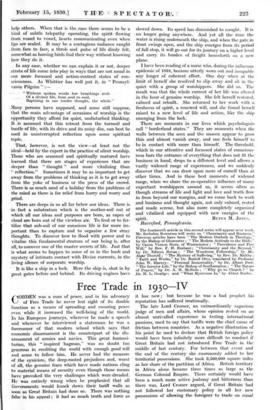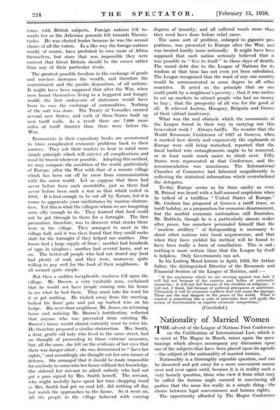Free Trade
in 19 3 0 IV COBDEN was a man of peace, and in his advocacy of Firm Trade he never lost sight of its double function as a means of spreading and ensuring peace even while it increased the well-being of the world. In his European journeys, wherever he made• a speech and whenever he interviewed a statesman he was a forerunner of that modern school which says that economic disarmament is the counterpart of the dis- armament of armies and navies. This great humani- tarian, this " inspired bagman," was no doubt too generous in crediting the world with enough good will and sense to follow him. He never had the measure Of the- cynicism, the deep-rooted prejudices and, worst of all, the genuine fears which have made nations cling to material means of security even though those means have provoked the very challenges which were dreaded. lie' was entirely wrong when he prophesied that all ' Governments would knock down their tariff walls as soon as Great Britain had done so. There was nothing false in his appeal ; it had as much truth and forte as it has now'; but because he was a bad prophet his reputation has suffered irrationally.
The late Lord Cromer, an extraordinarily sagacious judge of men and affairs, whose opinion rested on an almost unrivalled experience- in testing international passions, used to say that tariffs were the chief cause of friction between countries. As a negative illustration of his point he used to declare that British foreign policy would have been infinitely more difficult to conduct if Great Britain had not introduced Free Trade in the middle of last century. For between that event and 'the end of the century she enormously added to her territorial possessions. She took 8,500,000 square miles as her share of the partition of Africa. British territory in Africa alone became three times as large as the German Colonial Empire. There certainly would have been a Much more active jealousy and bitterness than there was, Lord Cromer argued, if Great Britain had n ot followed her customary -policy in all her new -possessions of allowing the 'foreigner - to trade- on equal terms with British subjects. Foreign nations felt to- wards her as the Athenian generals felt towards Themis- tocles. He was elected leader because he was the second choice of all the voters. In a like way the foreign nations would, of course, have preferred to own more of Africa themselves, but since that was impossible they were content that Great Britain should be the owner rather than any of their particular rivals.
The greatest possible freedom in the exchange of goods and services increases the wealth, and therefore the contentment and the pacific disposition, of all nations. It might have been supposed that after the War, when men found themselves living in a beggared and hungry world, the first endeavour of statesmen would have been to ease the exchange of commodities. Nothing of the sort was done. The Treaty of Versailles created several new States, and each of these States built up new tariff walls. As a result there are 7,000 more miles of tariff frontier than there were before the War.
Economists in their expository books are accustomed to trace complicated economic problems back to their sources. They ask their readers to bear in mind some simple principle which will survive all complications and must be traced wherever possible. Adopting this method, we may compare the condition of the world, particularly of Europe, after the War with that of a remote village which has been cut off by snow from communication with the outer world. Let us suppose that there had never before been such snowdrifts, just as there had never before been such a war as that which ended in 1918. It is bad enough to be cut off by Nature, but it is worse to aggravate your misfortunes by wanton obstruc- tion. Yet this is what the villagers whom we are imagining were silly enough to do. They learned that food could not be got through to them for a fortnight. The first precaution, therefore, was to discover what stocks there were in the village. They arranged to meet in the Village hall, and it was then found that they could make shift for the fortnight if they helped one another. One house had a large supply of flour ; another had hundreds of eggs in isinglass ; another had several hams, and so on. The better-off people who had not stored any food had plenty of coal, and they were, moreover, quite willing to pay well for the food of their neighbours. It all seemed quite simple.
But then a sudden inexplicable madness fell upon the village. Mr. Brown, a very excitable man, exclaimed that he would not have people coming into his house to see what he had there. They must take his word for it or get nothing. He rushed away from the meeting, locked his front gate and put up barbed wire on his hedge. His next-door neighbour, Mr. Jones, on returning home and noticing Mr. Brown's fortification, reflected that anyone who was prevented from entering Mr. Brown's house would almost certainly want to enter his. He therefore prepared a similar obstruction. Mrs. Smith, a dear, gentle old lady who lived in the same street, had no thought of proceeding to those extreme measures, but, all the same, she felt on the evidence of her eyes that there was danger afoot ; she was determined to " have her rights," and accordingly she thought out her own means of defence. She arranged that it should be made impossible for anybody to come into her house without her knowledge. She ordered her servant to admit nobody who had not got a pass signed by Mrs. Smith herself. The servant, who might usefully have spent her time chopping wood as Mrs. Smith had got no coal left, did nothing all day but watch the approaches to the house. So it went on. All the people in the village behaved with varying degrees of insanity, and all suffered- much more than they need have done before relief came.
The same sort of problem, enlarged to gigantic pro- portions, was presented to Europe after the War, and was treated hardly more rationally. It might have been supposed that each nation seriously believed that it was possible to " live to itself " in those days of dearth. The moral debt due to the League of Nations for its wisdom at that time has not even yet been calculated. The League recognized that the want of any one country would be communicated in some degree to all other countries. It acted on the principle that no one could profit by a neighbour's poverty ; that it was useless to set up markets to attract people who had no money to buy ; that the prosperity of all was for the good of all. It relieved Austria, Hungary, Bulgaria and Greece of their virtual insolvency. .
What was the real . obstacle which. the economists of the League found in their way in carrying out this benevolent work ? Always tariffs. No wonder that the World Economic Conference of 1927 at Geneva, when it marked how slowly and expensively the cupboards of Europe were still being restocked, reported that the fiscal barbed wire entanglements ought to be removed, or at least made much easier to climb over. Fifty States were represented at that Conference, and the recommendation was unanimous. The International Chamber of Commerce had laboured magnificently in collecting the statistical information which overwhelmed the delegates.
To-day Europe seems as far from sanity as ever. M. Briand was heard with a half-amused scepticism when he talked of a tariffless " United States of Europe." Mr. Graham has proposed at Geneva a tariff truce, or tariff holiday, as a preparation for economic disarmament, but the morbid economic nationalism still flourishes. Mr. Baldwin, though he is a particularly sincere seeker after peace, has somehow persuaded himself that the " modern artillery " of Safeguarding is necessary to shoot other nations into fiscal acquiescence, and that when they have yielded his method will be found to have been really a form of conciliation. This is sad ; nothing is more certain than that the League by itself is helpless. Only Governments can act.
In his Ludwig Mond lecture in April, 1929, Sir Arthur Salter, the distinguished Director of the Economic and. Financial Section of the League of Nations, said :- " If the machinery which we are erecting against war fails it will fail not .because of the caprices and follies of autocratic monarchs ; it will not fail because of the rivalries of religions ; it will not, I think, fail because of political grievances or ambitions. Ultimately it will be economic conflicts that will cause the damage. These are the real dangers to the peace of the world. What is wanted is something like a code of principles that will guide the action of Governments as regards economic competition.
(Concluded.)











































 Previous page
Previous page